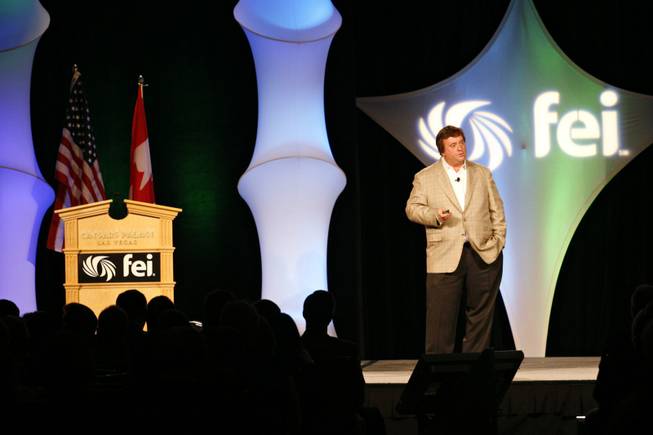
Gary Loveman, CEO of Harrah’s Entertainment, told the Financial Executives International at Caesars Palace on Monday what to expect for the gaming industry.
Friday, April 30, 2010 | 3 a.m.
The gaming industry is suffering the effects of a massive hangover brought on by the excesses of success in the 1990s and early 2000s, Harrah’s Entertainment’s top executive told 700 financial executives.
Gary Loveman, Harrah’s CEO, said in an April 26 speech at the Financial Executives International Leadership Summit at Caesars Palace that industry leaders can only hope they’ve learned something from the financial meltdown of the Great Recession.
The 15,000-member Financial Executives International is a networking group of chief financial officers, controllers, treasurers and finance and accounting professors. Loveman, Harrah’s president and CEO since 2003, has worked for the Federal Reserve and was a professor at Harvard University.
Loveman’s entertaining presentation featured clips from “The Hangover,” set in Las Vegas, as he explained how an industry that had been riding high for more than a decade is now suffering.
“We set ourselves up for one hell of a party, and we had a lot of fun. We did a lot of fun things,” Loveman said. “One might argue that we did a few things to excess. And then we woke up the next morning and our heads hurt, things were a little disheveled. It was hard to find some of the folks and the things we had been with the evening before. And we now find ourselves searching for a new equilibrium in a more demanding period.”
Loveman said the gaming industry outperformed virtually every industry in the years leading up to 2007. He explained that the industry found new strength with the consolidation of MGM Grand, Mirage Resorts and Mandalay Resort Group and his company acquiring Caesars Entertainment.
The regulatory environment was liberalized, there were major advances in gaming equipment technology, and the industry thrived in an environment of abundant and cheap capital.
But then the industry became obsessed with investing in the luxury market.
“If you go up the street, you’ll find $15 billion in newly opened capital,” he said, referring to CityCenter and investments by Steve Wynn in Encore and Sheldon Adelson in Palazzo.
“Is it nice? Loveman said of CityCenter. “It’s $9 billion — it better be nice.”
But “nice” was everywhere and financially hurting consumers couldn’t fill the oversupply of rooms. Operators were forced to discount their products.
When companies tilted their portfolios to the luxury end, it got harder and harder for companies to pay bills.
“You can imagine the burden we had to amortize capital,” Loveman said.
And as a result, there was “stranded capital” everywhere as buildings weren’t finished and roads weren’t paved.
Loveman said several state and local governments viewed gaming as a tax revenue generator and initiated outrageously high tax rates. Maryland, he said, imposed a 67 percent tax and placed it on revenue, not profits. The high tax rates did little to encourage investment in high-end facilities, he said.
Loveman predicted that casino companies will focus on software rather than hardware as they work on attracting more customers and use low-cost methods to keep customers at their properties.
Harrah’s recently rolled out a simple low-cost tactic, its new Buffet of Buffets program that offers one-cost, 24-hour access to any Harrah’s property buffet, he said. The idea is to keep customers loyal to the company’s properties.
Harrah’s also oversees the industry’s most successful loyalty program, Total Rewards, and uses it to attract more people.
Other highlights from Loveman’s presentation:
• The gaming industry will to seek more opportunities in Asia. He said Las Vegas Sands just opened a property in Singapore. Harrah’s is seeking entry into Macau and owns a golf course there.
• In response to a question about what Harrah’s property is most profitable, he said its highest return on investment normally occurs at properties most often considered low-end entries, such as Harrah’s on the Strip and Imperial Palace.
• There are some domestic growth opportunities for Harrah’s, but the high tax environment will prevent it from making large investments. Loveman views Ohio and Massachusetts as potential opportunities.
• Total Rewards’ database has helped Harrah’s Laughlin property thrive. The company identifies players in cities that generate revenue for the company and then arranges charter flights from those cities to Laughlin. The company offers transportation and rooms to players for free and invites high-volume players identified in the database on the Southern Nevada junkets, knowing that the level of play will make it lucrative for the company.
• The company plans to press for the legalization of online poker. Harrah’s owns the World Series of Poker franchise.
Loveman didn’t address a report by Bloomberg News that Harrah’s is interested in selling the Rio.
Harrah’s on April 27 reported it lost $195.6 million in the first quarter versus a loss in the year-ago first quarter of $132.7 million as revenue fell 2.9 percent to $2.188 billion.
At the Rio and on the Strip, same-store sales for Harrah’s — excluding the newly acquired Planet Hollywood — fell 4.4 percent.


Join the Discussion:
Check this out for a full explanation of our conversion to the LiveFyre commenting system and instructions on how to sign up for an account.
Full comments policy